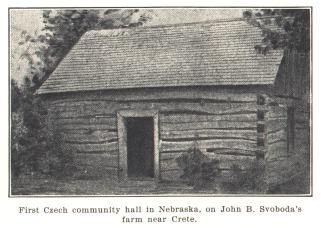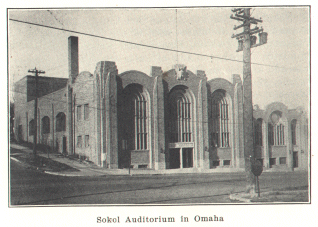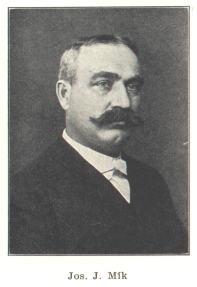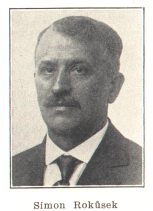 |
Organizations |
This is a NEGenWeb Project web page
and is presented as part of the
MARDOS Memorial Library Collection.
Organizations
|
In union there is strength. Humankind has discovered this fact long ago and since the days when guilds of medieval times came into being, societies, clubs and lodges have multiplied and prospered. This proves that organization meets a real social and economic need and Czechs are no exception to the rule. Indeed, organizations are more numerous among them than probably most nationalities. They are of two classes generally: Benevolent or confraternal, and non-benefit. To the latter belong the gymnastic (Sokol), dramatic, singing and social societies. The benevolent or rather fraternal insurance orders do not pay high sick benefits or insurance, but they are directed by people who draw moderate salaries (compared to large English-language orders) and have been a great boon to many who could not otherwise afford life insurance. They serve a twofold purpose--material help in time of need and a means for social gatherings, so dear to Czechs. Indeed, the social part of it is very important to people from a foreign country, for they naturally have a sentiment for their native land and like to meet with others of their kind. The gymnastic, dramatic and singing societies supply needs of a social character and no community of any size is without at least one. Even in pioneer days this need was evident. In truth, for immigrants in a strange land, with little or no proficiency in the English language, with no social opportunities, it was all the more pressing. So we find that within a very few years after the first settler came to any locality, a club was organized. Thus in Crete, Saline County, Joseph Jindra was instrumental in founding a reading society in 1867, two years after the first Czech set foot in that vicinity. It was the first Bohemian society or Club in the state and was changed later to a Sokol club and still later to a lodge of the Bohemian Slavonian Benevolent Society, of which mention is made elsewhere. In Omaha, Frank Mares (brother-in-law of V. L. Vodicka) called a meeting in 1872, for the purpose of forming a society to foster the Czech language and social life. On January 26, 1873, officers of the organization, called The Reading And Benevolent Society, were chosen. Frank Mares was president, Matej Nerad secretary and Vaclav Kucera treasurer. This club disbanded in 1875 and the money remaining in the treasury was divided as follows: $50.00 was given to the reading circle of the dramatic society Klicpera, for the purchase of books; $20.00 was sent to Professor Ladimir Klacel, a former monk and philosopher, who was unable to adapt himself to earning a living in this country and subsisted mostly by support of his countrymen; and $22.00 went to Czechs in Nebraska who were victims of the grasshopper plague. For these latter also a benefit ball was given.  The dramatic club Klicpera (the name of a Czech play-wright) in Omaha was founded by F. B. Zdrubek August 23, 1874. On July 22, 1877, Lodge Palacky No. 19, Bohemian Slavonian Benevolent Society, was founded. Later it became affiliated with the Western Bohemian Fraternal Association. In Schuyler, Colfax County, Joseph W. Zerzan founded a reading society in 1875, which became, later, a lodge of the Bohemian Slavonian Benevolent Society (Lodge Zapadni Jednota). In 1874 the rural settlement Tabor in Colfax County also had a reading society. The clubs just described are the first of which we have record and it is significant that they were formed at a time when life was a struggle for existence in a bare, unsettled country. They are a strong proof that our pioneers hungered for intellectual food, while being denied, in many cases, sufficient food for the body. Czechs brought to this land their love for music, drama, dancing and singing, so much more common on the European Continent than here, where Puritanism has left traces. This quality of their temperament explains the somewhat frequent mention of saloons and dance halls in pioneer times. An overwhelming proportion of the first comers were tillers of the soil. There was a scattering of artisans but almost none as yet had engaged in business. When the settlers came to town, what was more natural than their desire to meet those with whom they could talk, where they could partake of the beverage they had known in the homeland? Their liking for harmless entertainment resulted in the building of dance or what were really community halls. This phase of their lives was criticised by their native-American neighbors, but when we compare it with whiskey drinking, gambling, horse stealing and similar aspects of pioneer days, it appears mighty innocent. Our people formed dramatic clubs for the purpose of producing amateur theatricals. In Saline County the first performance of a dramatic kind was given in 1869, as described in the history of the settlement of that county. In Omaha the first dramatic performance was given in 1869, in Stepanek's Hall, on Thirteenth and William street (then a wagon road). Or rather it was the first public gathering of Czechs, the commemoration of the burning of Hus. The following appeared on the programme: Matej Nerad, Frank Mares, Eleonora Vodicka, Flora Pintner and Anna Kares. A one-act play "Rozpustili kluci ve skole" (Bad Boys In School) was given, with the following taking part: Matej Nerad, Frank Mares, John Stibal, Frank Vodicka, Flora Pintner (later Mrs. Krejci of Cleveland, Ohio), and Eleonora Vodicka (later Mrs. Frank Mares of Crete). That was on July 6, while later, in October of that year, the play "Divotvorny Klobouk" (The Magic Hat) was given, with the following players: F. Sprosty and wife, Mrs. and Mr. Maly, Miss Eleonora Vodicka, Frank Mares and others. Later "Prvni den po svatbe" (The Day After the Wedding) was given, then came an interim until 1874, when F. J. Sadilek, now of Wilber arrived and put new life into drama. From that time dramatic performances have been given steadily, now for many years a regular season of six or eight plays being produced. It is probably the oldest amateur theatrical organization in the state. In Colfax County probably the first performance of this kind was given in the country church settlement Tabor, near Howell, in 1874, by the Bohemian Reading Society. The play was "Hluchonemy Frantik" (Deaf And Dumb Frank), with the following participating: Mr. and Mrs. F. J. Jonas, George Jonas (now living in Stuart, Holt County), Miss Mary Sindelar (now Mrs. John Poledna) and J. B. Sindelar (now living in Howell), who had the title role. The affair took place in the sodhouse home on the farm of F. J. Jonas, the curtain being two sheets sewn together. A dance followed, for which the only band in the country played, that of Vaclav Svoboda (who now lives in Omaha). That same year and in the same place was given a playlet "Frantik, prazsky student" (Frank, a Prague Student), with J. B. Sindelar again in the title role, and the rest of the actors as in the preceding play. As to music, the Czech adage says: A Czech, a musician. There is a good band in even the smallest community. The Frank Nedela band of Crete in the early seventies was not only the first Czech band in Nebraska, but for a time the only one west of Omaha. We have in mind a professional band, that played for pay, whenever hired to do so. No doubt there were even then many musical groups, wherever three or four musicians met together. Detailed mention of Nedela's band is made in the history of Saline County. The Tel. Jed. Sokol of Omaha for a number of years in the eighteen-nineties annually conducted an excursion to one of the larger Czech settlements. A train was chartered from Omaha, on Sunday, and was often joined by others along its branch lines. Arriving at their destination, the participants found a large crowd gathered from all the surrounding countryside, and merry time was had by all. Singing societies were found in the larger settlements, and thus with the aid of speeches, songs, music and plays, many celebrations were held, aside from dancing parties. Catholic societies celebrated and still celebrate occasions connected with their church and give plays and dances. Non-Catholics for many years never failed to commemorate the burning of John Hus (July 6, 1415) and the loss of the Bohemian kingdom to the Hapsburgs (at the battle of White Mountain, November 8, 1620). These latter have practically ceased. To the younger generation they mean little or nothing and besides, since Bohemia has become free, the latter has lost its poignancy. With the exception of the gymnastic (Sokol) societies, the class just described belong to no orders or unions (which keep regular records) and it is impossible to give detailed data. Of the lodges belonging to the large fraternal organizations, we do have such information and are able to give it. Bohemian Farmers' Mutual Aid Society In Nebraska: Inasmuch as Nebraska stands first as a habitat of Czech farmers, it is proper that we place this society first, all the more because it was the first and only one of its kind here. It was founded in March 1876 and functioned to 1893, seventeen years. Its object was to furnish insurance against damage to wheat, rye, barley, oats and, later, flax, corn and potatoes. As an instance, in 1889 damage by hail amounted to $2553.66 and insurance was paid at the rate of $68.68 for every $100.00. It numbered fifty unions or societies, with one thousand members, and was founded by Joseph Hanzl, a pioneer miller of Glencoe, Dodge County (a postoffice no longer in existence). Hanzl was aided by John Rosicky, for the former was not proficient in English. Hanzl was manager for eight years and was succeeded by John F. Sobota of Praha, Colfax County (also discontinued as a postoffice) a farmer and postmaster there. Four years later he was succeeded by Joseph V. Holecek (of whom more mention is made in the history of Knox County), and he was succeeded in 1891 (four years later) by Vaclav (Vencl) Krikac Sr., then living in Geranium, Valley County (now in Comstock, Custer County). In 1893 the society disbanded. From the beginning until 1890 the weekly Pokrok Zapadu was the official organ, following that the Nova Doba in Schuyler, Nebraska. This society was most beneficial to those pioneers, for they knew little or no English. Those who came after them are able to enter English-language insurance societies. Another non-insurance organization was that of the educational clubs Komensky, of which mention is made in the chapter on schools. Sokol Gymnastic Society: In Czech: Telocvicna Jednota Sokol. This order has been an important factor in Czech national life in this and the mother country and is the only order in this country that had its inception in Bohemia. It was established in Prague, Bohemia, in 1862, at a time when the nation was awakening from a lethargy produced by two hundred years of repression of the language and national feeling, by the Hapsburgs. As mentioned in the chapter on religion, the Czech language and patriotism had been kept alive mainly among the peasants. The city and town population was indifferent or favored the German. The reason for this probably is that peasants are economically more independent. In the cities, however, when the problem of a business calling or career was presented, the people had to submit to those in power. With the birth of this Society or Order a new national program was born. Equality, harmony, fraternity! A healthy mind in a healthy body! These were its aims. The object was dual: Physical training for the body, national or patriotic training for the mind. The Order grew and prospered and has always played an important part in the affairs of its nation. Being comprised largely of the younger men, it stands for virility, energy and enthusiasm, as well as for democracy and patriotism. Lodges or clubs were formed in this country soon after the first immigrants settled here.  The first society in Nebraska was founded by John K. Mallat (born in Humpolec, lived long in Wilber, Nebr., died in Glendale, California, May 31, 1926) in 1875, the Reading Society there being its nucleus, but later was changed to a lodge of the Bohemian Slavonian Benevolent Society. The second was founded in Omaha, in the home of Frank Jelen, September 3, 1877, its founders being: Frank Jelen Sr., Joseph Vlna, John Konvalin, Frank Boukal, John Sokol, Joseph Kavan, John Svacina, Frank Vodicka, Vaclav Kos, John Holecek, Frank Vlna, Vaclav Kohout, Joseph Priborsky, Leopold Krenk, Vojtech Veleta, Peter Svacina, Anton Pokorny, Joseph Fiala, Frank Raitera. It is still in existence and is therefore the first of those now in being. At the present time there are in Nebraska the following societies, with 1,111 members of both sexes. ABIE, Tel. Jed. Sokol Karel Jonas; BRUNO, Tel. Jel. Sokol; Brush Creek Precinct (Saline County), Tel. Jed. Sokol; BURWELL, Tel. Jed. Sokol; CRETE, Tel. Jed. Sokol; DODGE, Tel. Jed. Sokol; OMAHA, Tel. Jed. Sokol; ORD, Tel. Jed. Sokol; PRAGUE, Tel. Jed. Sokol; SCHUYLER, Tel. Jed. Sokol; SOUTH OMAHA, Tel. Jed. Sokol Fuegner-Tyrs; RAVENNA, Sokol Ravennsky; WILBER, Tel. Jed. Sokol. 
The general office for the western district of the Tel. Jed. Sokol is in Omaha. At one time this district comprised the majority of the states west of the Mississippi, of late it takes in So. Dakota, Kansas and Nebraska only. The committee in charge of this office is active in forming new clubs and in fostering the advancement of the movement as a whole. Since the war many new clubs have been formed; a director of athletics is maintained continually (and he visits all the clubs to superintend the work); tournaments and exhibitions are given annually and the interest of the older people is sought with a view of encouraging physical and moral education of the young people. More has been done in this direction during the last four or five years than in the entire preceding period. This is largely due to the efforts of Simon Rokusek, president and Joseph J. Mik, secretary of the Western District Committee. Joseph J. Mik was born August 25, 1859 in Dolejsi Lukavice, County Prestice. He came to St. Louis, Mo., in 1873 and in 1884 to Omaha. In 1891 he married Miss Anna Drozda (born in Malechov), their only child being Marie Mikova, the famous pianiste. In 1889 Mr. Mik entered the services of the Burlington & Missouri Railroad Company and for years has been station master of the depot in Omaha. He thus meets so many people that he has been called the "best known Czech in America". He has always been active in Sokol life, as well as in other Czech patriotic and cultural movements. 
Simon Rokusek was born in 1874 in Chelcice and came to Omaha in 1894. In 1897 he married Miss Marie Klabenes (born in Malochin). Since 1897 in business as baker. Mr. Rokusek has always been active in patriotic and social life of Omaha Czechs, as officer of the Western Bohemian Fraternal Association and Tel. Jed. Sokol. In 1889 the first Sokol organization for women (Sokolky) was founded in Omaha, Nebraska, in the home of Mrs. Mary Kriz. At the present time there are in Nebraska the following clubs, with 330 members: CRETE, Libuse; OMAHA, Omaha and Tyrs; SOUTH OMAHA, Libuse; SCHUYLER, Vlastenky. Our Catholic people have their Catholic Sokol societies also, as shown in the list of Catholic organizations. The members of these Sokol clubs meet regularly for practice, give public exhibitions and compete in tournaments. With the German Turners they have been the pioneers in gymnastic sports, today so popular with American youth. However, they do not confine themselves to athletics alone, but are ever in the foreground and ready to assist with all patriotic and cultural projects. |
| Back | Table of Contents | Next |